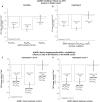Adrenergic beta-1 receptor genetic variation predicts longitudinal rate of GFR decline in hypertensive nephrosclerosis
- PMID: 19745105
- PMCID: PMC2790952
- DOI: 10.1093/ndt/gfp471
Adrenergic beta-1 receptor genetic variation predicts longitudinal rate of GFR decline in hypertensive nephrosclerosis
Abstract
Background: End-stage renal disease (ESRD) due to hypertension is common and displays familial aggregation in African Americans, suggesting genetic risk factors, including adrenergic activity alterations which are noted in both hypertension and ESRD.
Methods: We analysed 554 hypertensive nephrosclerosis participants (without clinically significant proteinuria) from the longitudinal National Institute of Diabetes and Digestive and Kidney Diseases (NIDDK) African American Study of Kidney Disease and Hypertension (AASK) cohort to determine whether decline in glomerular filtration rate (GFR) over approximately 3.8 years was predicted by common genetic variation within the adrenergic beta-1 (ADRB1) receptor at non-synonymous positions Ser49Gly and Arg389Gly.
Results: The polymorphism at Ser49Gly (though not Arg389Gly, in only partial linkage disequilibrium at r(2) = 0.18) predicted the chronic rate of GFR decline, with minimal decline in Gly(49)/Gly(49) (minor allele) homozygotes compared to Ser(49) carriers; concordant results were observed for haplotypes and diploid haplotype pairs at the locus. An independent replication study in 1244 subjects from the San Diego Veterans Affairs Hypertension Cohort confirmed that Gly(49)/Gly(49) homozygotes displayed the least rapid decline of eGFR over approximately 3.6 years.
Conclusion: We conclude that GFR decline rate in hypertensive renal disease is controlled in part by genetic variation within the adrenergic pathway, particularly at ADRB1. The results suggest novel strategies to approach the role of the adrenergic system in the risk and treatment of progressive renal disease.
Figures



Comment in
-
Not so free associations.Nephrol Dial Transplant. 2009 Dec;24(12):3576-7. doi: 10.1093/ndt/gfp509. Epub 2009 Sep 30. Nephrol Dial Transplant. 2009. PMID: 19793933 No abstract available.
Similar articles
-
Methylenetetrahydrofolate reductase (MTHFR) polymorphism A1298C (Glu429Ala) predicts decline in renal function over time in the African-American Study of Kidney Disease and Hypertension (AASK) Trial and Veterans Affairs Hypertension Cohort (VAHC).Nephrol Dial Transplant. 2012 Jan;27(1):197-205. doi: 10.1093/ndt/gfr257. Epub 2011 May 25. Nephrol Dial Transplant. 2012. PMID: 21613384 Free PMC article. Clinical Trial.
-
Progression of chronic kidney disease: Adrenergic genetic influence on glomerular filtration rate decline in hypertensive nephrosclerosis.Am J Nephrol. 2010;32(1):23-30. doi: 10.1159/000313927. Epub 2010 May 19. Am J Nephrol. 2010. PMID: 20484896 Free PMC article.
-
Common charge-shift mutation Glu65Lys in K+ channel β₁-Subunit KCNMB1: pleiotropic consequences for glomerular filtration rate and progressive renal disease.Am J Nephrol. 2010;32(5):414-24. doi: 10.1159/000320131. Epub 2010 Sep 23. Am J Nephrol. 2010. PMID: 20861615 Free PMC article.
-
The link between hypertension and nephrosclerosis.Am J Kidney Dis. 1995 Feb;25(2):207-21. doi: 10.1016/0272-6386(95)90001-2. Am J Kidney Dis. 1995. PMID: 7847347 Review.
-
Proteinuria and hypertensive nephrosclerosis in African Americans.Kidney Int Suppl. 2004 Nov;(92):S102-4. doi: 10.1111/j.1523-1755.2004.09224.x. Kidney Int Suppl. 2004. PMID: 15485398 Review.
Cited by
-
Combined Effects of GSTM1 Null Allele and APOL1 Renal Risk Alleles in CKD Progression in the African American Study of Kidney Disease and Hypertension Trial.J Am Soc Nephrol. 2016 Oct;27(10):3140-3152. doi: 10.1681/ASN.2015050487. Epub 2016 Mar 3. J Am Soc Nephrol. 2016. PMID: 26940095 Free PMC article.
-
Heritable influence of DBH on adrenergic and renal function: twin and disease studies.PLoS One. 2013 Dec 31;8(12):e82956. doi: 10.1371/journal.pone.0082956. eCollection 2013. PLoS One. 2013. PMID: 24391727 Free PMC article.
-
Methylenetetrahydrofolate reductase (MTHFR) polymorphism A1298C (Glu429Ala) predicts decline in renal function over time in the African-American Study of Kidney Disease and Hypertension (AASK) Trial and Veterans Affairs Hypertension Cohort (VAHC).Nephrol Dial Transplant. 2012 Jan;27(1):197-205. doi: 10.1093/ndt/gfr257. Epub 2011 May 25. Nephrol Dial Transplant. 2012. PMID: 21613384 Free PMC article. Clinical Trial.
-
Progression of chronic kidney disease: Adrenergic genetic influence on glomerular filtration rate decline in hypertensive nephrosclerosis.Am J Nephrol. 2010;32(1):23-30. doi: 10.1159/000313927. Epub 2010 May 19. Am J Nephrol. 2010. PMID: 20484896 Free PMC article.
-
Genome-wide association study of kidney function decline in individuals of European descent.Kidney Int. 2015 May;87(5):1017-29. doi: 10.1038/ki.2014.361. Epub 2014 Dec 10. Kidney Int. 2015. PMID: 25493955 Free PMC article.
References
-
- Freedman BI, Spray BJ, Tuttle AB, et al. The familial risk of end-stage renal disease in African Americans. Am J Kidney Dis. 1993;21:387–393. - PubMed
-
- Ferguson R, Grim CE, Opgenorth TJ. A familial risk of chronic renal failure among blacks on dialysis? J Clin Epidemiol. 1988;41:1189–1196. - PubMed
-
- Rahman M, Douglas JG, Wright JT., Jr Pathophysiology and treatment implications of hypertension in the African-American population. Endocrinol Metab Clin North Am. 1997;26:125–144. - PubMed
Publication types
MeSH terms
Substances
Grants and funding
LinkOut - more resources
Full Text Sources
Medical
Research Materials
Miscellaneous

